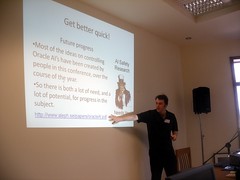June 30, 2012
Small gods: why you should not believe in powerful gods
 Here is a hilarious game theory argument against standard theism: [1206.6752] God exists with probability 1/(H+1)
Here is a hilarious game theory argument against standard theism: [1206.6752] God exists with probability 1/(H+1)
The basic idea is that is a rational (but imperfect and finite) human plays a "game" against God, who is rational and perfect. The human can choose between being good or bad, and God can choose to exist or not (presumably in the sense of interfering with the universe or not). Being good has a cost of -1 to the human if God doesn't exist and a reward H (heaven) if God exists, and being bad has a human reward of +1 or -H (hell). But God also has some preferences: if it exists it gets +X for having the human being good and -X for being bad. If God choses not to exist there is zero payoff.
For this game there are three equilibria: humans being good and God existing, humans being bad and God not existing, and a mixed strategy where the human has a 50% chance of being good and God choses to exist with with probability 1/(H+1). Since humans are imperfect they cannot play the pure strategies, and hence they must play the mixed strategy. God must also do so, since otherwise the rationality assumptions break down.
Hence the higher the claim H is, the less likely we should regard the existence of God. Preachers arguing it is infinite are inadvertently implying that God doesn't exist or doesn't intervene. On the other hand, really wussy Gods with H close to 1 have a high chance of existing by this argument. Terry Pratchett was clearly onto something in Small Gods:
There are billions of gods in the world. They swarm as thick as herring roe. Most of them are too small to see and never get worshiped, at least by anything bigger than bacteria, who never say their prayers and don’t demand much in the way of miracles.They are the small gods-the spirits of places where two ant trails cross, the gods of microclimates down between the grass roots. And most of them stay that way.
The rational choice for the human with a prior with a bounded support is hence to believe in a fairly weak god.
June 29, 2012
Après nous, le déluge: legislating science
 Après nous, le déluge: legislating science | Practical Ethics
Après nous, le déluge: legislating science | Practical Ethics
I blog about North Carolina's attempts to legislate how to plan for sea level rise, and what the real role of science should be in policy.
If I could write this kind of policy I would try to do the opposite: mandate a devil's advocate in every question to reduce overconfidence and groupthink. Sure, the sea level looks set to increase, but can you make a policy that makes sense if it grows far less or far more than your best estimate?
June 14, 2012
Ecstasy and love
 Should you take ecstasy to improve your marriage? Not so fast … - a small response by me, Julian and Brian about some newspapers that misunderstand our love drug papers.
Should you take ecstasy to improve your marriage? Not so fast … - a small response by me, Julian and Brian about some newspapers that misunderstand our love drug papers.
Basically, they tend to assume (as per how science is normally reported) that we are presenting some new wonder pill (would *you* take a pill developed in the philosophy department?), and since our paper mentions MDMA they also assume there is ecstasy in our recipe for marital bliss.
It is not unreasonable to think that something like MDMA, used in the right way, might be helpful for couples. But that remains to be properly investigated: what we argue is that it is a good thing to do this investigation, since enhancements of love bonding would be helpful for human well-being. Whether the enhancement happens through pills, smarter therapies, gamification of marriage (10 points for smooching!) or magical ceremonies doesn't matter.
Given the high likelihood of placebo effects and self-delusion in this domain, investigations have to be pretty stringent to find what actually reliably works - just trying things will likely mostly give placebo effects and loud claims "it works for us!" with little empirical reliability. The real problem might be that people and their relationships are so different that the ideal treatments have to be totally individual and we can never figure out what actually works. However, going at the deepest common denominator - well-preserved brain systems - seems a good start.
June 13, 2012
Diversity, inequality and the views in the departmental coffee room
 The Diversity that Dare Not Speak Its Name - Dave Frame has a very good post about the mystery of leftist overrepresentation in the social sciences. The mystery is not so much that there is less diversity in the department as why people are so OK with it, despite clamouring loudly for more diversity in other domains. He goes through various ethical responses for why the status quo is acceptable, finding them all flawed. Very well worth reading.
The Diversity that Dare Not Speak Its Name - Dave Frame has a very good post about the mystery of leftist overrepresentation in the social sciences. The mystery is not so much that there is less diversity in the department as why people are so OK with it, despite clamouring loudly for more diversity in other domains. He goes through various ethical responses for why the status quo is acceptable, finding them all flawed. Very well worth reading.
For some reason the blog didn't accept my comments, so I put them here:
Hayek
The issue isn't new. Friedrich Hayek wrote about it in 1949, in "The Intellectuals and Socialism". An interesting early essay about cognitive bias and memetics, containing many of Dave's possible explanations. Hayek wrote:
"If we are to understand this peculiar bias of a large section of intellectuals, we must be clear about two points. The first is that they generally judge all particular issues exclusively in the light of certain general ideas; the second, that the characteristic errors of any age are frequently derived from some genuine new truths it has discovered, and they are erroneous applications of new generalizations which have proved their value in other fields."
His theory was that the leftist bias was due to the spread of a few core theories in the field, applied excessively outside their actual domain of applicability but gaining credence because of empirical support or explanatory success in their core domains. But there is also an emergent effect, where the conservative mindset lends itself towards academic specialisation while socialism (due to its universalist ideas) lends itself towards becoming a general intellectual, spreading ideas more widely. This produces a consensus by having the left wing ideas dominate the discourse.
So maybe it is the nature of the social sciences that make them particularly easy to politically bias. The type and limitations of empirical data and the kind of theories and methodologies used play an important role. Then there are things like Schelling-effects, self-interest etc. that amplify the initial bias. One might compare with economics, where a somewhat similar but opposite effect is prevalent.
Hanson
Robin Hanson has pointed out that while there are plenty of people thinking economic disparities should be evened out, people seem to be entirely fine with inequalities in sexual success. Yet the latter category probably has at least a similar level of importance for adult well-being as the first. While one might argue that economic equality promotes a number of well-being promoting things beyond direct happiness, like political justice, it is still very telling that sexual success inequality is rarely mentioned even as a problem. (Except of course in the domain of sexual minorities, where rules preventing them from expressing their sexuality are often seen as deeply problematic).
While one can likely find reasonable ethical explanations for this particular case (whether they are rationalisations of underlying emotional or social factors is another matter), Robin's main point was that we do care about *some* inequalities or diversities, but not others. He points out that we seem to be fine with vast inequalities of academic or athletic achievement beyond a certain level, inequalities in know-how, physical fitness, appearance and many other life domains. These inequalities represent high diversity of outcomes. Yet only some are seen as problems that need to be dealt with, either by reducing inequality (when diversity is seen as bad) or increasing diversity (when inequality is seen as bad). In some cases I think it is possible to make principled statements of this case (reducing diversity of infectious disease is dominated by the gains of human health), but in many cases it is just a brute cultural fact what we regard as problematic.
In the case of sociology departments it seems that lack of diversity actually works counter to the aim of learning more about human social relations: vigorous debate and avoiding groupthink is helped by a diversity of views. So there would be a reason to try to increase diversity. However, just as in the case of sexual success diversity, there might be ethical problems with the possible *means* to achieve it. Affirmative action for conservatives might be against academic freedom etc. But I am not certain there are *no* possible and moral means. It is just that, since it is one of the domains where diversity is not valued enough, people are unlikely to investigate possible solutions.
Still, the domains of acceptable and unacceptable inequality/diversity shift over time as culture changes/is changed. Inequality of power or diversity of political views have changed in importance, so there is hope for sociology too. What I wonder is whether we are making progress about caring about the inequalities that actually matter, and how we know it.
June 12, 2012
The Oracle Speaks
 Stuart's, Nick's and mine paper on Oracle AI is now officially published: Stuart Armstrong, Anders Sandberg and Nick Bostrom, Thinking Inside the Box: Controlling and Using an Oracle AI, Minds and Machines 2012, DOI: 10.1007/s11023-012-9282-2.
Stuart's, Nick's and mine paper on Oracle AI is now officially published: Stuart Armstrong, Anders Sandberg and Nick Bostrom, Thinking Inside the Box: Controlling and Using an Oracle AI, Minds and Machines 2012, DOI: 10.1007/s11023-012-9282-2.
A preprint can be found here. Stuart's explanation of the topic can be viewed here. And my Eclipse Phase adventure based on the paper is here.